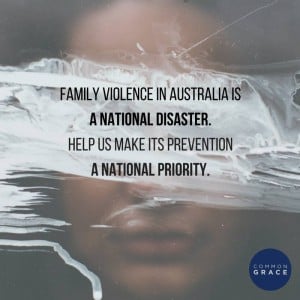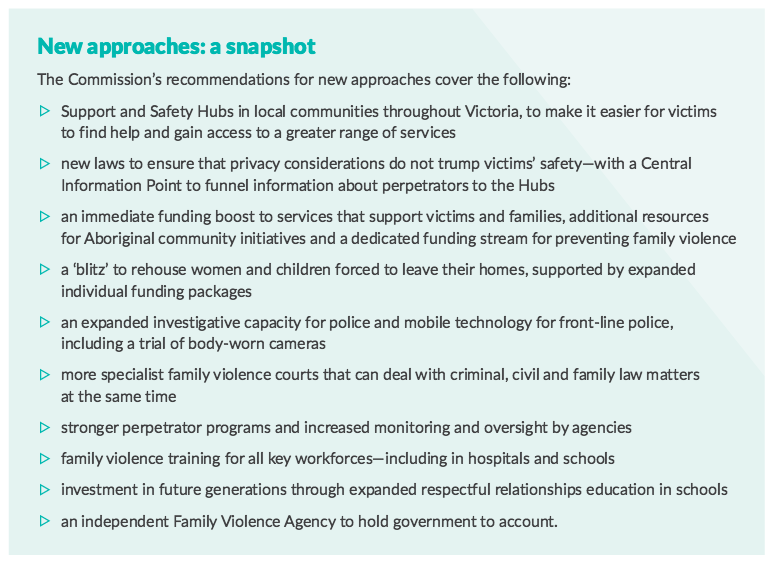The Victorian Royal Commission into Family Violence has released its recommendations this week in a report Victorian Premier Daniel Andrews said will “change everything” and which recognised the significant impact faith communities can have both positively and negatively in responding to family violence.
Following 13 months of hearings and submissions, the Commission released its almost-2000 page report, outlining the 227 recommendations to come out of the Commission, including the establishment of safety hubs for victims, a push to keep victims at home while forcing the abuser to leave, and an emphasis on creating a more comprehensive information-sharing system between police, the courts and family service providers.
A spokesperson for Common Grace, a Christian group passionate about Jesus and justice, said, “This is a once in a generation opportunity to achieve real change. We want to see all government and both sides of politics work together on the much needed reforms.”

Common Grace released this image as the 227 recommendations of the Royal Commission were handed down.
On social media, the group said, “Common Grace grieves with victims who have wanted to leave violent situations but have had nowhere to go and no support to stay safe. As we start to see changes to the systems that support victims and hold perpetrators accountable, Common Grace longs to see the Australian churches become powerful advocates for prevention, intervention and healing.”
“It is time to adequately resource the service system that has been underfunded and ignored for too long. We know that this means significant new funding, and we want to see Christians get behind rallying for this,” said the Common Grace spokesperson.
The report was welcomed by the Victorian Premier, Daniel Andrews, who promised to implement all recommendations, saying in a media release, “this report will change everything. Our family violence system has failed victims for too long.”
“I refuse to look back in ten years’ time and admit that we could have done more to save innocent lives. We will get this right. There can be no more excuses. Our work begins today to overhaul our broken family violence system from the bottom up,” said Andrews.
The report devotes an entire chapter and three of its recommendations to faith communities, saying, “faith settings are an integral part of the community response to family violence. Faith leaders and organisations have direct and influential contact with many members of the Victorian community, and their guidance and intervention are often sought when family violence is being experienced. The trust communities have in their faith leaders enables these leaders to play an important role in educating communities about family violence, reinforcing community standards in relation to respect, dignity and non-violence, and providing practical advice and assistance to people in need.”
But the report also makes clear that faith leaders consulted during the Commission indicated their need for assistance in understanding how to prevent, recognise and respond to domestic violence appropriately. The Commission noted that, “training for faith leaders in recognising and responding to family violence is generally inadequate.”
Additionally, the Commission noted that, “some attitudes and practices, and inadequate or ill-informed responses by faith leaders, risk exposing victims to further and sustained abuse by their family members. Women experiencing family violence can face barriers to seeking help within their faith community because of particular religious beliefs (for example, about divorce or gender roles). These barriers can force women into making a choice between their safety and their faith.”
Barbara Roberts is a survivor of domestic abuse and author of Not Under Bondage: Biblical Divorce for Abuse, Adultery and Desertion. Her own story of domestic abuse within two Christian marriages informs her views on how faith communities often fail victims of domestic abuse, and she said, “by and large, churches don’t get it about domestic abuse. They think they do, they think they know how to respond and think they can recognise it and respond appropriately.
“[But] faith leaders are often very entrenched in presuppositions and teachings which they think are ‘orthodox’ by their scriptures,” says Roberts. “Many faith leaders don’t realise how much they are inadvertently enabling abusers and delivering injustice to victims. They need to examine how their underling presuppositions and their current teachings and policies may actually be harming victims of abuse.”
“My experience as a victim-advocate and educator in the Christian community is that many Christian leaders are reluctant to use secular resources from the family violence sector, and instead they attempt to develop resources and responses themselves.”
Roberts suggested that the Christian community needs to humble itself and learn from the secular family violence professionals.
Rachel Neary works as a domestic and family violence educator at the Alice Springs Women’s Shelter, and is one of the leaders of the Common Grace campaign against domestic violence, and said, “we now have an indication the far-reaching extent of domestic and family violence in this nation.
“It is not enough anymore to simply say ‘this is shocking or awful’. We can change the future so those experiencing domestic and family violence can call helplines or arrive at shelters and receive a high quality service. We can also save lives. These recommendations need to be rolled out across states and territories,” said Neary.
“A national rollout is important in the Central Australian context because there is a huge amount of movement between the tri-state region in Central Australia (NT, SA, WA) of both victims and perpetrators. I welcome all moves towards greater perpetrator accountability, particularly in relation to children where many women face the threat of children being removed from their care if domestic and family violence occurs, which can often be completely out of her control.”
One of the main recommendations of the Royal Commission is to generate new laws ens
uring that privacy considerations do not trump victims’ safety, and pushes for the creation of better inter-agency information sharing systems, to stop what they call ‘siloing’ – where one agency is the gatekeeper of a particular domestic family violence situation.
Neary said that ”both South Australia and the Northern Territory have an inter-agency information sharing response to high-risk cases of domestic violence. If an individual or family is assessed at high risk they can be referred into the Family Safety Framework where all relevant agencies including police, non-government organisations, Corrections, Centrelink (though they are bound by Federal privacy laws), Housing, Education and Child Protection can share relevant information about both victims and perpetrators in order to reduce the risk of harm to victims. So far this approach has worked well in both SA and the NT as a means of reducing homicides and keeping victims and their children safe.”
The Royal Commission also recommended the development and growth of specialty family violence services, including safety hubs, new courts, and more support services for victims and families. Contrary to this recommendation, in some states (NSW), there has been a move to outsource family violence services to organisations that may not have expertise in family violence (sometimes even replacing specialist domestic violence services with generic homelessness services). But Neary said, “specialist family violence services are imperative for keeping women and children safe, and are crucial in terms of performing risk assessments, safety planning and longer term needs.
Some of the key recommendations of the report include:
- Establishing one-stop safety hubs: establishing highly-visible support and safety hubs so that victims can access information and help in their local area.
- More money: for support services for victims and families, for Aboriginal community initiatives, and a dedicated funding stream for preventing family violence.
- Expanding “safe at home”: prioritising keeping victims in their home, where possible, and forcing the abuser to leave.
- Increased investigative capacity: growing police and mobile technology for front-line police.
- Housing “blitz”: to rehouse women and children forced to leave homes, supported by more funding
- Creating new laws: ensuring privacy considerations do not trump victims’ safety, and establishing a Central Information Point to share information about perpetrators with safety hubs, and police and courts.
- More courts: the creation of specialist family violence courts that can deal with criminal, civil and family law latters at the same time.
- More training: for all key workforces including hospitals and schools
- Family Violence Agency: establish new agency to hold government to account.

New approaches: a snapshot, page 15 of report of the Royal Commission into Family Violence
See the whole (2000-page) report here.
Read more on domestic and family violence:
- A letter made me think, by Kate Bradford
-
A Christian response to domestic violence, by John Harrower
- Under our own roof, by Natasha Moore
-
Enough is Enough: new campaign addressing domestic violence, by Tess Holgate
Domestic Abuse Hotline: 1800RESPECT (1800 737 732)
Email This Story
Why not send this to a friend?

